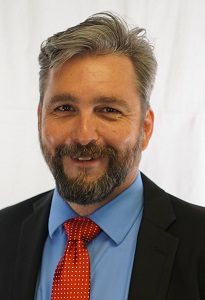Rep. Probst struggles to understand the purpose of government

Hutchinson Democrat Rep. Jason Probst published an article to his Substack on Monday titled Back to the Basics: Recalling old lessons and the intent of government. While some things he said were correct, most of what he said was very far off and is worth breaking down to understand better.
His article starts off talking about the history of the Roman Empire and this idea that the welfare of the people should be the supreme law. I absolutely do not disagree with this, and this sentiment is even written into the preamble of our Constitution. However, as he continued his writing, he gets further and further away from this idea.
Rep. Probst goes onto list three “realities,” and the first reality just hooked me as a WTF moment.
“Everyone brings to the table their own idea of who “the people” are and their own idea of what “welfare” means. For some, people means others who look, act, worship and experience life just like them. For others, it means a group of marginalized people, or a particular identity. We struggle in this environment settling on who government is here to serve. (But I’ll tell you one thing – this system doesn’t go out of its way to do much for people who don’t vote).”
This stuck out to me because dividing people up like this is just not in my mind, and I see this type of thinking as extremely problematic. The People are “the people.” If you are a citizen of the U.S., you are the People. That’s it. It’s not too hard. To suggest that it would only include “others who look, act, worship and experience life just like” you or to see it only as groups of “marginalized people, or a particular identity” is extremely racist, sexist, and homophobic, regardless of which one you pick. We can’t really know if Rep. Probst sees “the people” in one of these lights. He may very well just be pointing out problematic ways people see things, but please don’t think these two examples are the only ways of seeing “the people.”
“As my therapist sometimes reminds me, a yes to one thing is a no to something else. Often, it seems, a policy that serves one group of people potentially harms another. The debates in representative government are often formed around right-or-wrong morality on issues, when it is really about a conflict of competing rights – and the conflict between factions as cultural norms and expectations change.”
I found this second “reality” completely concerning. The reason being is that rights do not “compete.” Rights exist to be rights. The idea that they would be in competition would lead to a number of questions like why does someone’s right trump another person’s right? Is it because of the specific right? Is it because of the person? Is it because of something else entirely? It also seems to be a progressive idea that rights change as time moves on and things change. However, regardless of “cultural norms and expectations” rights do not change. Furthermore, the idea that government would be making laws based on “morality” should also be a red flag for anyone as this suggests the government is way bigger than it should be.
His third “reality,” I did agree with. It was just about how “normal” is a social construct and what was normal during the time you were born was different from normal 50 years prior and 50 years later.
Rep. Probst then goes on to list eight ways things would look different if the Kansas Legislature focused on the welfare of the people, in his view.
“Policy discussions would begin with people, viewed through the lens of service and assistance.”
Going based off of Rep. Probst voting history, his idea of “service and assistance” is growing the government. The reality is that the government cannot create value for people, and this seems to be something that a lot of people, especially people on the left, have a hard time understanding. I would much rather policy discussion begin with people and be viewed through the lens of how the government made it worse and what can be done to get government out of the way of the people.
“We’d have a lot fewer conversations about how to punish poor people for being poor. Or how to make them do what others want them to do without understanding anything at all about a life in chronic poverty.”
I think that Rep. Probst is right on the money with this point, because it is true. Government does punish poor people for being poor. Driver’s license suspension policies are a prime example of how poor people get screwed over by the system and why there is a desperate need for reform which would include getting government out of the way so that people can live their lives and be productive members of society.
“We’d stop protecting legacy industries that have long enjoyed the benefit of policies, regulations and tax structures that advantage them and often create barriers for competitors.”
Again, this is another thing that Rep. Probst does get right. Unfortunately, politicians on both sides of the political spectrum are bought and, through the use of a government that is far too big for the People’s own good, they implement laws that impede on the free-market and ultimately make things more expensive and worse for people for the sake of their lobbyist friends.
“There would be a concerted effort to create a wider lane, so to speak, on which an ever-increasing number and variety of people can thrive. A people-centered government, in my view, would constantly pull more people in and create more opportunities for more people, recognizing there are many paths forward, not just the one that worked for one group of people in one specific period of time.”
This point, I think, really nails home how little Rep. Probst understands the purpose of government. It is not the government’s job to create opportunities for people, and in fact the government regularly takes opportunities away from people as it grows bigger. The government cannot create real jobs or real wealth. That is an ability that lies strictly and only with the Free People.
He did make a few other points that were a mix of things I agreed with and disagreed with, but these few really stood out and I think they give a good understanding of what Rep. Probst is about.
After his short list, his next paragraph was beautifully written. He goes into differing points of view and the importance of talking to people with opposing viewpoints. He does state in this paragraph that people differ on what the problems are, which I disagree with. I think most people do agree with what the problems are. I think most people disagree with the solutions to those problems.
He then goes from that to how big business has an influence in government.
“In Kansas, that has translated into an open hand to business – in the form of corporate tax reductions, increased incentives and loosening of regulations, all while we can scarcely have a real conversation about people-centered policies like Medicaid Expansion and tax reform that would actually save middle class taxpayers some real money,” Rep. Probst writes.
This paragraph shows his partisanship and really highlights his cringe mentality that too many people have where they see government as the “good guys” and they see businesspeople as the “bad guys” despite the opposite being true. Loosening of regulations is a good thing. Most regulations are arbitrarily made by the government and makes it harder to run a business. On top of that Medicaid Expansion is a government-centered policy, not a people-centered policy. It is literally designed to grow the government bigger at the expense of the people under the false impression that it would “help” people. As far as the “tax reform that would actually save middle class taxpayers some real money,” the Republican flat-tax would have done this, as I covered previously, and he voted against it due to his partisan ideology.
The rest of his article comes off like a politician on a campaign trail. He seems to understand that the government shilling for businesses isn’t a good thing, which I’m glad he understands. Unfortunately, it comes off as though he seems to think that businesses looking out for themselves in anyway possible (you know, like a business) means businesses are the bad guys when in reality it’s the corrupt government that picks winners and losers despite that not being the purpose of the government.
Thanks for reading. Be sure to share and subscribe. You can also help support independent journalism in Kansas by buying me a coffee at buymeacoffee.com/kscon.

Ian Brannan
Ian Brannan is an independent journalist who founded The Kansas Constitutional in April 2022. His work focuses on issues including abortion, Convention of States, drug policy, education, government, LGBT issues, media, and more.
